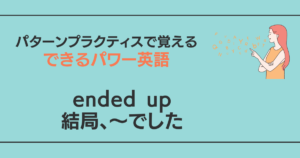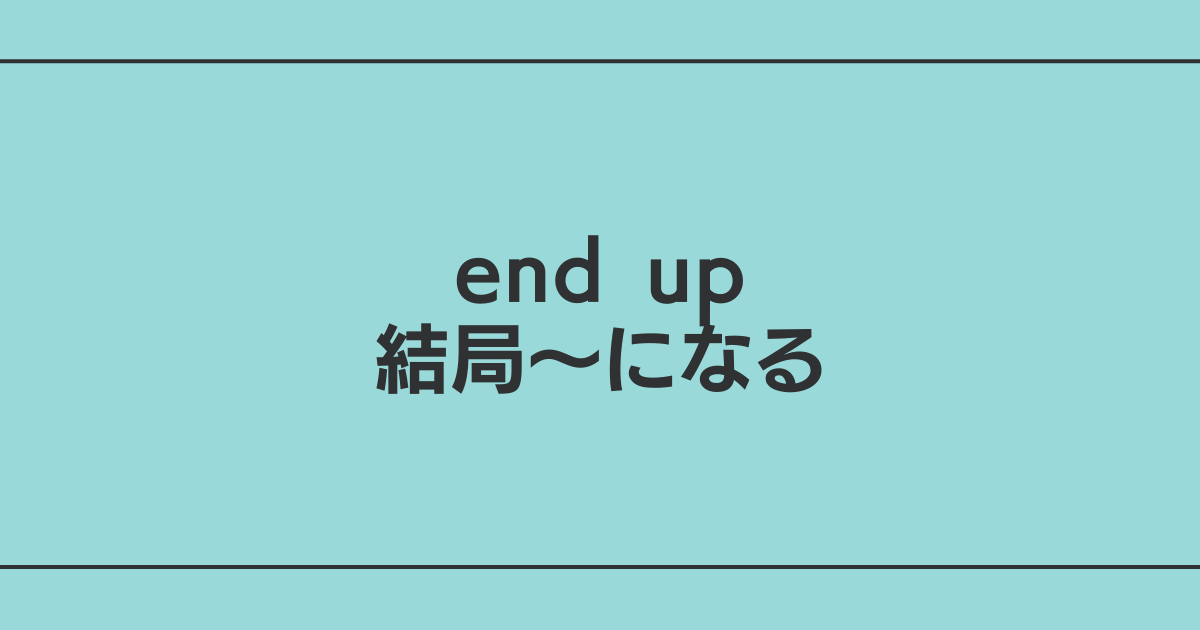end upは、ある状況や結果に至るという意味を表す英語のフレーズで、主に未来の結果や結論、結果的な状況を示すのに使われます。具体的なアクション、状態、場所などを指し、予想外の結果や最終的な結果を表現する際によく用いられます。
文法的には、end upの後に動詞が来る場合は、その動詞は現在分詞(-ing形)を取ることに注意が必要です。また、end upの後に名詞や形容詞を置くことも可能です。
あわせて読みたい


ended up…「結局、~でした」の意味・使い方・例文・会話例【音声付きパターンプラクティス】
「知っているはずの英語なのにとっさに頭に浮かばない!」という悩みを解決する「できるパワー英語」です。 1回、たった3分のトレーニングで確実に使いこなせるようにな...
目次
end up を使った例文
- I might end up working late tonight.
「今夜は遅くまで働くことになるかもしれない」 - If you don’t study for the test, you could end up failing.
「テストのために勉強しなければ、失敗することになるかもしれない」 - She ended up moving to New York for her job.
「彼女は仕事のためにニューヨークに引っ越すことになった」 - We ended up at a nice restaurant after wandering around the city.
「街をぶらぶらした後、素敵なレストランに行くことになった」 - They might not end up buying the house after all.
「結局、彼らはその家を買わないかもしれない」 - Do you think we will end up winning the game?
「私たちは試合に勝つことになると思う?」 - I didn’t end up going to the party because I was too tired.
「私は疲れすぎてパーティーに行くことにならなかった」 - She ended up marrying her high school sweetheart.
「彼女は最終的に高校時代の彼と結婚した」 - If you keep overspending, you’ll end up in debt.
「度重なる浪費を続けると、借金を抱えることになる」 - You could end up regretting your decision.
「あなたは自分の決断を後悔することになるかもしれない」
会話例
A: Where do you think we’ll end up tonight?
「今夜、私たちはどこに行くことになると思う?」
B: I’m not sure. We might end up at the cinema if it’s not too late.
「わからない。遅くなければ映画館に行くことになるかもしれない」
今回の重要語句
- working late: 「遅くまで働く」
- wandering around the city: 「街をぶらぶらする」
- overspending: 「度重なる浪費」「過度な支出」
類似表現
- wind up: end upと同じように、ある結果に至るという意味を表します。しかし、wind upは特に予期しない結果を強調する傾向があります。
- turn out: このフレーズは、事情や事態が特定の状況で終わる、特定の方法で発展するという意味で使われます。end upと似た使い方をしますが、turn outは結果が明らかになるまでのプロセスを強調することが多いです。
